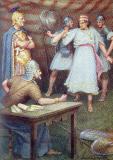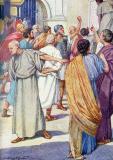Sulla
(Lucius Cornelius )
138–78 BC
 |
The First Mithradatic War lasted from 88 to 84 B.C. Athens had gone over to Mithradates, and was serving as his central command post in Greece. Sulla besieged and sacked the city before winning several other important victories against Mithradates, and driving him back to Pontus. He did not return to Rome until 83 B.C. In his absence, however, the populares party, under Cinna and Marius, had raised an army and taken over control of the city by force. Both leaders were already dead by the time Sulla returned to Rome, but many of their partisans still controlled all the public offices. Sulla again advanced on the city with his army, and was met by a force led by the son of Marius. Sulla prevailed after a furious Civil War, and slew all 6,000 of the prisoners he took. He then marched into Rome, declared himself dictator, and started systematically putting all of his rivals to death. Instead of murdering them outright, he had them first declared public enemies. These lists of public enemies were called proscriptions. They made it a crime for anyone, even a family member to protect them, and allowed the government to confiscate their property upon their death.
In order to understand Sulla's actions, it must be remembered that the party of Sulla's enemy Marius was composed of rich and powerful men who claimed to represent the interests of the poor, rather than poor people themselves. Since the populares had seized control of the government by force, Sulla saw himself as reforming the government, and putting things back in proper order. He held his dictatorship for less than three years, and then retired from public life. He spent his few remaining years writing his memoirs, and travelling freely around Rome without a bodyguard, convinced that posterity would exonerate him. He died in 78 B.C. and wrote his own epitaph (a masterpiece of understatement): "No friend ever served me, and no enemy ever wronged me, whom I have not repaid in full."
Key events during the life of sulla:
| Serves under Marius in Africa; set a trap to ambush Jugurtha. | |
| Serves under Marius in northern Italy, against the Teutone and Cimbri Gauls. | |
| Serves in the Social War. | |
| Elected Consul. Sent against Mithradates, but returns to Rome to send his enemy Marius into exile. | |
| Sacks Athens after year-long siege, and prevails over Mithradates at Chaeronea. | |
| Prevails again over Mithradates at Orchomenus; Marian party takes control in Rome and purges Sulla's allies. | |
| Mithradates is driven back to Asia, and a temporary peace is concluded. | |
| Returns to Rome with an army of 40,000 men. Civil war ensues. | |
| Sulla's party prevails; Sulla made dictator; purges and proscriptions begin. | |
| Reorganizes government to favor the aristocratic party over the popular (Marian) party. | |
| Retires from public life. Moves freely about Rome without a bodyguard. | |
| Dies peacefully in his villa outside Rome. |
Other Resources
| Marius and Sylla in | Julius Caesar by Jacob Abbott |
| In the Days of the Dictator in | Roman Life in the Days of Cicero by Alfred J. Church |
| Red General in | Tales of the Romans: The Children's Plutarch by F. J. Gould |
| Social War in | The Story of the Romans by H. A. Guerber |
| Proscription Lists in | The Story of the Romans by H. A. Guerber |
| Sulla in | Famous Men of Rome by John H. Haaren & A. B. Poland |
| Sylla in | Our Young Folks' Plutarch by Rosalie Kaufman |
| Capture of Jugurtha in | The Story of Rome by Mary Macgregor |
| Sulla Enters Rome with His Troops in | The Story of Rome by Mary Macgregor |
| Sulla Besieges Athens in | The Story of Rome by Mary Macgregor |
| Proscription of Sulla in | Historical Tales: Roman by Charles Morris |
Image Links | ||
|---|---|---|
 Sulla in Famous Men of Rome |
 Sulla Fights his Way into Rome in Greatest Nations - Rome |
 Sylla entering Rome in Our Young Folks' Plutarch |
 Jugurtha came to the tent of his father-in-law unarmed. in The Story of Rome |
 Lists of those who were doomed were hung up in the Forum. in The Story of Rome |
|
| Renowned general. Modernized legions. Waged a bloody feud with party of Sulla. | |
| Cinna | With Marius, raised an army, and took possession of Rome for populist Party. |
| King of Pontus, enemy of Rome, raised rebellions in Greece and Asia Minor. | |
| Led Rome against Mithradates in third Mithradatic War. Known for extravagant lifestyle. | |
| Led rebellion against Rome in Spain; held out for 8 years. | |
| Very renowned general. Defeated pirates. Led opposition to Caesar in civil war. |